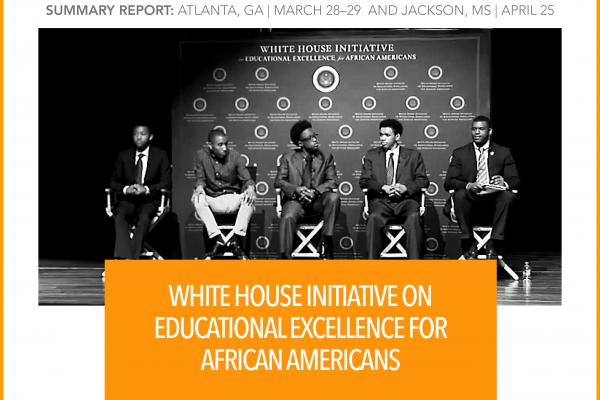
Successful Young African American Men Voice Strategies and Concerns in White House Summits
 The route to early success for African American men requires adept navigation of conscious and unconscious racism, as well as capitalizing on available supports, according to a new report from UNC’s Frank Porter Graham Child Development Institute (FPG). The report from FPG’s Research, Policy, and Practice Alliance for Supporting Excellence in Black Children (RPP) reviews the first public summits this year that are part of the new White House Initiative on Educational Excellence for African Americans (WHIEEAA).
The route to early success for African American men requires adept navigation of conscious and unconscious racism, as well as capitalizing on available supports, according to a new report from UNC’s Frank Porter Graham Child Development Institute (FPG). The report from FPG’s Research, Policy, and Practice Alliance for Supporting Excellence in Black Children (RPP) reviews the first public summits this year that are part of the new White House Initiative on Educational Excellence for African Americans (WHIEEAA).
The purpose of these town hall meetings is to raise awareness, highlight best practices, and support community engagement by listening to young African American males who have distinguished themselves in their communities and at their academic institutions. The report summarizes themes and provides samples of conversations with panelists ranging in age from high school freshmen to college seniors in summits at Morehouse College in Georgia and Jackson State University in Mississippi.
“These are probably among the most important discussions that we will have,” said WHIEEAA executive director David J. Johns in the report. “Far too frequently people talk about Black men and boys without allowing us the space to articulate what is it that we feel, what it is that we think, and how it is that we are already working to change our schools and our communities and our country.”
As a group, the panelists spoke about the value of using their education and receiving support from family members, other individuals, and programs to help them develop and excel. Although none discussed experiencing the more overt and heinous acts of racism and discrimination of past decades, they provided numerous examples of facing contemporary bias—which people sometimes hold unconsciously.
“Unconscious or implicit bias describes discriminatory attitudes and stereotypes that are outside of an individual’s awareness or intentional control,” said FPG scientist Dr. Donna-Marie C. Winn, whose RPP team spearheaded the report in partnership with CommonHealth Action. “These biases are different from the ones that individuals choose to conceal because of pressures to be socially or politically correct. These biases happen in an instant, but they do not have to determine our actions.”
The African American males who participated in the summits have been subject to a variety of very restrictive stereotypes, including such personas as “criminals” and “entertainers,” as well as such attributes as “lazy,” “uneducated,” and “lacking in aspirations.” As one panelist reported, “We are expected to barely get by or to fail.”
“Dispelling myths and highlighting true, accurate narratives of Black men and boys can work to remove barriers to academic success and workforce preparedness,” said Winn, who has been speaking at the summits about ways to promote educational excellence among African Americans. “There’s overwhelming evidence from research and practice that our nation can do a much better job of removing the obstacles that disproportionately undermine the success of young males of color. The only question is, ‘Will we?’”
In spite of experiencing bias, many young African American males continue to succeed in school and afterwards. To cope, the panelists said they wear “masks” to seem less dangerous in public; rely on trusted family, friends, and mentors; defer to authority when necessary; learn to problem-solve and adapt; use humor; and enjoy defying old stereotypes.
They also recognize their worth in their communities.
According to Winn, one panelist from Morehouse College has started a successful shoe company. “He said, ‘For every pair of shoes we sell, we provide meals for children in shelters around the city of Atlanta.’” He and others spoke about their commitments to communities and being servant leaders.
In addition, the young panelists place great significance both on providing and receiving mentorship, which they cited repeatedly as an integral resource for learning, growth, and development. Many of them actively identify strengths in the people and institutions that are available to support them.
According to the report, panelists have distinct goals for the supports they receive and recognize that by further engaging fathers, minority male educators, and mentors these supports “can take them to the next level.” Said one young panelist, “If everyone helped one person get to that next level, who knows where we’d all be?”
The Initiative’s 2014 Summits on Educational Excellence for African Americans continued June 13 and 14 at Laney College in Oakland, California.
Contact
Donna-Marie C. Winn, Scientist
UNC’s Frank Porter Graham Child Development Institute
donnamarie.winn@unc.edu
In addition to Donna-Marie C. Winn, FPG’s Research, Policy, and Practice Alliance for Supporting Excellence in Black Children includes Marvin McKinney, Iheoma Iruka, Christine Harradine, Jenille Morgan, Nakenge Roberts, Mark McDaniel, and Toni Glatz.
Read the Summary Report on 2014 Summits and Town Halls on Educational Excellence for African American Males
Read more about the 2014 Summits on Educational Excellence for African Americans
